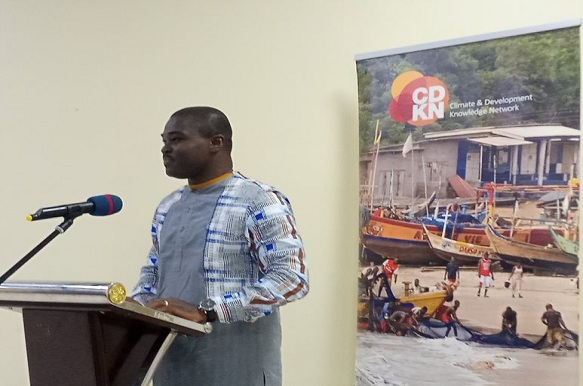
Accra, April, 26, GNA – Dr Felix Addo Yobo, the Director for Development, Policy and Planning at the National Development Planning Commission (NDPC), has called for the need to develop concepts and projects that attract Private Sector investment.
He said: “Development of concepts and initiating projects that attract the Private sector is the surest ways of accessing enough funds and making climate change financing challenges a thing of the past”.
Speaking at a Dissemination Workshop for Revised Nationally Determined Contributions in Accra, he said: “We cannot rely on the green funding, concessions, loans or grants to pursue climate change agenda.
“We need a mind shift in this regard and look at the bigger picture of financing climate change gaps.
The workshop was organised by the Climate Knowledge and Development Network (CKDN) in collaboration with the Institute for Environment and Sanitation Studies-University of Ghana to sensitise and boost engagement with the public on climate change in Ghana.
Dr Addo Yebo noted that “the biggest pot of funding sits with the private capital venture and not in the green funding and that is where we need to look”.
“…What will it take for us to get access to that pot of money that are sitting there idle looking for investment opportunities… so if we see the financing as not a challenge but as financing opportunities and then prepare projects to attract private sector investors, it becomes a win-win situation”.
He indicated that there was a strong competition for global Climate change funding, which accessibility, he said, requires a very strong proposal.
“It takes a lot of skills capacity to put together a very strong and good proposal to meet the requirements of the green funding and other funding out there”, he added.
He, however, emphasised that when Investors get attracted to the concepts “they will put their money into the NDCs and we will meet our NDCs commitment and the Private sector will also make money out of it”.
He later expressed delight on what he termed as “subtle shift from emphasis on early warnings and disaster preventions to early warning, disaster risk management and response”.
He explained that the shift gives it a broader scope which focuses on whole cycle of disaster as opposed to the earlier objective that focused mainly on prevention.
“Its imperative for us to pay attention to what happens during the disaster. How we work around it to minimise the impact and what we do after the disaster to bring people and businesses back to their pre-disaster state”.
Dr Addo Yebo said: “Being climate resilient is not about how well a country was able to withstand disaster but rather how well people’s livelihoods and businesses bounce back.
Dr. Ted Yemoh Annang, a Senior Researcher of the University of Ghana, stressed the need for climate communication to be targeted at the local communities by involving them in the dissemination of climate information rather than leaving the Communications only to the media.
That, he said, would enable the local people to better appreciate the subject matter and be deeply involved in the fight against climate Change.
Professor Chris Gordon, the Country Lead, Climate Knowledge and Development Network, Ghana urged stakeholders to collaborate with each other to access big funding for projects.
He said: “It is rather sad that in our part of the world, people do not want to partner with others in doing projects…but they forgot that when they come together that they can come out with brilliant proposals that can win them big projects”.
Climate Change Financing gap continue to pose a threat to the achievement of the Nationally Determined Contributions (NDCs).
The NDCs are a set of Climate Change agreements signed onto by Countries and is to help reduce global warming and make those countries, including Ghana, climate change resilient.
Ghana has updated its NDCs under the Paris Agreement from 2022 to 2030, considering its unique circumstances.
The update affirms the Ghana’s resolve to address the impact of climate change on the country’s economic and its vulnerable people.
By Patience Gbeze